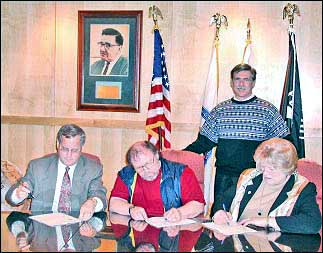















Successes in Stewardship: August 2004 |
|---|

|
Federal Highway Administration
August 2004
Formalizing Relationships with Tribal Groups: Section 106 Programmatic Agreements in Minnesota

Streamlining the Section 106 Process. FHWA Minnesota Division Administrator Alan Steger, Fond du Lac Tribal Chairman Robert Peacock, MnDOT Duluth District Engineer Mike Robinson, and Minnesota Lieutenant Governor Carol Molnau participate in a signing ceremony for a Section 106 programmatic agreement.
As one of the considerations of the National Environmental Policy Act (NEPA), cultural resources are to be protected under Section 106 of the National Historic Preservation Act. To comply with Section 106, the Federal Highway Administration (FHWA) and State Departments of Transportation (State DOTs) must take all necessary precautions to ensure that any potential adverse impacts to historic properties and artifacts from a transportation project are avoided, minimized, or mitigated.
Each Native American tribe has distinct customs and traditions, so it is important that government agencies use procedures specifically tailored to the tribe with which they are working on transportation or cultural matters. This is why some States, such as Minnesota, have begun to develop programmatic agreements to formalize the Section 106 process with each tribal group in the State. Through these agreements, uncertainty about the process is minimized for both transportation agencies and tribal groups. A transparent process that respects Native American preferences and culture engenders better working relationships among agencies and tribes, resulting in more successful and streamlined Section 106 compliance.
Cheryl Martin of the FHWA Minnesota Division identified working with tribal groups on cultural resource issues as an area of the NEPA process that could be improved and streamlined in that state. In particular, she noted the inefficiency stemming from the lack of established working agreements with the eleven Native American tribes of that state. At an environmental conference, Ms. Martin learned of an agreement between the FHWA Rhode Island Division and the Narragansett Indian Tribal Historic Preservation Officer (THPO); she researched it further on FHWA's environmental streamlining website. The Rhode Island agreement relates to transportation projects that have no effect on cultural resources and allows small operations -- such as installing signage, paving, and other maintenance -- to proceed without formal tribal consultation in each instance. The programmatic agreement, therefore, significantly accelerates the approval process for these routine or small-scale activities.
Ms. Martin and the FHWA Minnesota Division used the Rhode Island agreement as a template to initiate similar agreements with Minnesota tribes. Each tribe was consulted individually and these discussions were used as the foundation for the initial draft of a programmatic agreement. Ironing out the final language of the agreement required several rounds of discussions with each tribe. Many iterations of the document were modified and each version is approved by the tribes, the Minnesota Department of Transportation (MnDOT) Cultural Resources Unit, MnDOT District Engineers, the MnDOT Tribal Liaison, and the FHWA Minnesota Division.
As of August 2004, three of the eleven tribes in Minnesota had signed programmatic agreements with MnDOT and FHWA Minnesota Division: the Lower Sioux Indian Community, the Bois Forte Band of Chippewa, and the Fond du Lac Band of Chippewa. The FHWA Minnesota Division has met with and initiated negotiations with all other tribes in Minnesota to develop their own programmatic agreements.
Many of the issues covered in the Minnesota programmatic agreements are tailored to local needs and differ from the original Rhode Island template. Five major issues are addressed in the MN agreements:
Because each of the completed agreements has been signed within the last year, an extensive evaluation of the effectiveness of the agreements has yet to be completed. However, anecdotal evidence from those working in Minnesota indicates a smoother, more efficient process when Section 106 issues arise. Most of this improvement stems from the fact that FHWA Minnesota Division and MnDOT now have established points of contact for each tribe and know when and how to contact them. Through the successful Section 106 programmatic agreements and new tribal initiatives (see sidebar), Minnesota has become a leading State in developing successful working relationships with tribal groups.
Contact InformationCheryl Martin
|
|
|
